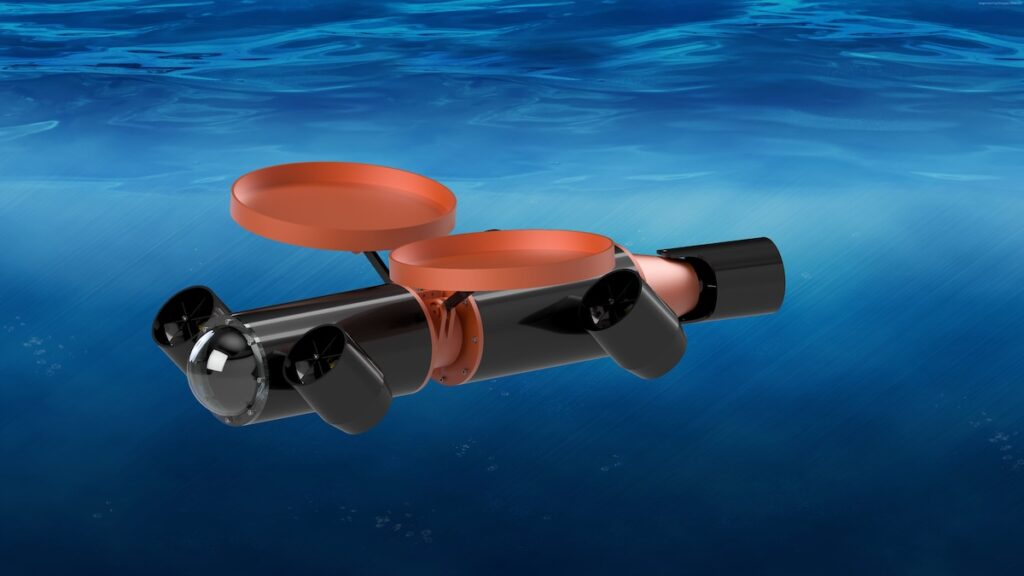An underwater robot pioneered by Edinburgh scientists could be deployed to autonomously clean ships’ hulls – reducing costs and environmental damage.
ScrubMarine will join Heriot-Watt university’s startup programme to commercialise its idea to use deep sea androids to tackle the shipping industry’s problem of ‘biofouling’.
This is when microorganisms, plants and algae build up on ships hulls, causing damage to propulsion systems and adding to fuel consumption.
If allowed to accumulate, it can significantly increase drag of up to 60 per cent, reducing speeds and increasing fuel consumption by up to 40 per cent.
ScrubMarine, which will join the university’s DeepTech LaunchPad, aims to develop complex navigation and control systems required for the real-world application of its robotic solution.
To do this, the startup will utilise Heriot-Watt’s array of experts from across its three global campuses and the cross-discipline research outputs of four global research institutes – including iNetZ+, the emerging Global Research Institute for Net Zero transition and beyond.
Clyne Albertelli, founder of ScrubMarine, said: “In the vast ocean of innovation, ScrubMarine is committed to charting a cleaner and more efficient course for the marine industry. Our underwater robot, powered by deep-learning and supported by Heriot-Watt’s DeepTech LaunchPad, aims to scrub away biofouling challenges, reducing fuel costs and environmental impact. Together, we’re diving into a brighter and cleaner future for marine transportation.”
The DeepTech LaunchPad, supported by Barclays Eagle Labs through the Department for Science, Innovation and Technology Digital Growth Grant, is providing six organisations with access to tailored services, facilities and equipment within Heriot-Watt and the National Robotarium, the world-leading centre for robotics and artificial intelligence based at the University’s Edinburgh campus.
ScrubMarine joins five other highly innovative companies from sectors including self-care, prosthetics, and food services. These include Borobo Ltd, founded by industrial designer Alexandre Colle, which aims to advance a new robotics platform targeting enhanced power management and electronic board design.
GI Healthcare Industries, led by entrepreneur and engineer Aswath Ganesan Indra, is revolutionising food services with semi-autonomous cooking robots for institutional catering. Infinity DPM is creating advanced upper limb prosthetics through expert engineering and biomechanics by founder and mechanical engineer David Yeudall.
Janki Group, led by architect Aisha Janki Akinola, is building an AI-powered tattoo robot system for the personal self-care industry, whilst Wynter Robotics is building mobile robotic solutions for construction industry applications such as measuring, bricklaying, and wood frame assembly.
The six successful companies will receive training and support from the university’s commercialisation team, helping them to become investment-ready with proven prototype products, industry partners and a viable route to market.
Jamie Allan is Heriot-Watt University’s Deeptech Launchpad programme leader. He said: “The DeepTech LaunchPad marks an incredibly exciting step in strengthening Scotland’s innovation ecosystem and establishing Heriot-Watt as a global leader in commercialising deep technology research. As an international university with campuses and partnerships spanning the world, Heriot-Watt is uniquely positioned to help entrepreneurs translate their ideas into transformative and commercially viable solutions.
“Through this pilot programme, our six-strong cohort will gain access to world-leading facilities like the National Robotarium as well as our vast network of international industry connections, experts and alumni to accelerate their cutting-edge research toward commercial success on the global stage. By fostering this collaboration, we empower the translation of deep science into transformative solutions ready to make real-world impact.
“We eagerly anticipate the fruits of this hands-on commercialisation experience and look forward to continued engagement with these innovators as they bring remarkable technologies to market across critical sectors like medical devices, food technology, robotics, and sustainability.”
